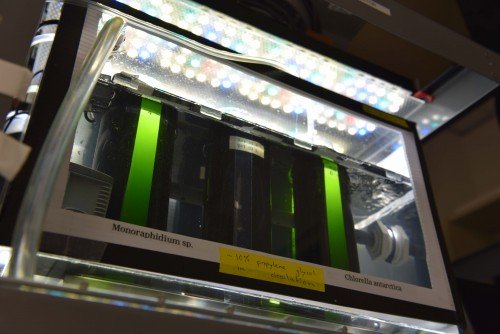
PNNL’s Laboratory Environmental Algae Pond Simulator system, also known as LEAPS, mimics the frequently shifting water temperatures and lighting conditions that occur in outdoor ponds at any given place on earth. This allows researchers to test multiple algae strains with the conditions at different places, but without the cost and time needed to actually grow them at those locations. Credit: Pacific Northwest National Laboratory
Researchers are working to pinpoint which algae is best used as a source for renewable energy.
As part of a nearly $6 million collaborative project, researchers are mimicking natural conditions in a laboratory and attempting to use a streamlined process to pare down heaps of algae species into just a handful that will hold the most promise for renewable fuels.
Scientists have long thought algae could be used for renewable resources but have often struggled in simulating natural conditions in a laboratory.
The Algae DISCOVR (Development of Integrated Screening, Cultivar Optimization and Validation Research) Project has scientists attempting a new approach to reduce the cost and the time needed to move promising algal strains from the lab and into production.
“Algae biofuel is a promising clean energy technology but the current production methods are costly and limit its use,” the project’s lead researcher, Michael Huesemann of the Department of Energy’s Pacific Northwest National Laboratory (PNNL), said in a statement. “The price of biofuel is largely tied to growth rates.
“Our method could help developers find the most productive algae strains more quickly and efficiently.”
The goal is to identify four promising strains from at least 30 initial candidates at the conclusion of the three-year pilot project.
The project started by using PNNL’s Laboratory Environmental Algae Pond Simulator mini-photobioreactors.
The system mimics the frequently shifting water temperatures and lighting conditions that occur in outdoor ponds.
The glass column photobioreactors act like small ponds and are placed in rows to allow scientists to simultaneously grow multiple different types of algae strains.
Each photobioreactor is exposed to unique temperature and lighting regimens by using heaters, chillers and heat exchangers, as well as colored lights simulating the sunlight spectrum.
The algae strains with suitable growth will be studied further to measure their oil, protein and carbohydrate content, as well as for valuable co-products including food dye phycocyanin, which could be used to make algae biofuel production more cost-effective.
After the algae strains are narrowed down, they will be tested further at a larger outdoor pond in Arizona.
The final component of the pilot is the team will attempt to understand how fast the strains that fared best outside grow in different lighting and temperature conditions.
The project began in the fall of 2016 and is led by the PNNL’s Marine Sciences Laboratory in Sequim, Washington.
The project team includes three other DOE labs—Los Alamos National Laboratory, National Renewable Energy Laboratory and Sandia National Laboratories—as well as Arizona State University’s Arizona Center for Algae Technology and Innovation.




